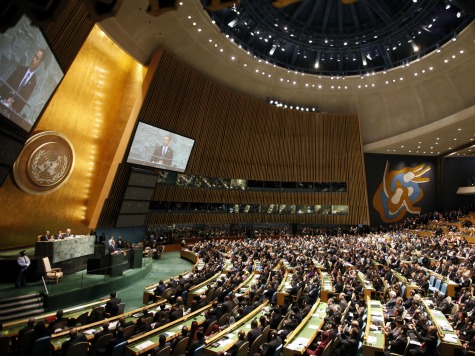Addressing the nation on Friday evening about the actions of the Boston terrorists, President Barack Obama posed the question “why.” After all, the suspects had been direct beneficiaries of American largesse, including a successful asylum application, a green card and citizenship.
Clues, however, are not nearly as concealed as the President made out. Look west to United Nations Headquarters in New York City, just a few hours away.
At exactly the same time that the Tsarnaev brothers were building their bombs and planning their attack, Islamic front men at the UN were demanding that the organization define terrorism with an exception clause for “legitimate struggle.”
In 2013 the United Nations still has no definition of terrorism. For over a decade, a committee involving all UN states has been charged with drafting a so-called comprehensive convention against terrorism and producing a definition. But year-after-year the effort is thwarted by Islamic countries that want no legal impediments to murder in the name of “self-determination” or “national liberation.”
On April 12, after a week of negotiations, the UN issued a summary of the stumbling blocks, highlighting in particular the position of the Organization of Islamic Cooperation (OIC). The summary includes: “Several delegations emphasized the need to distinguish terrorism from the legitimate struggle of peoples under colonial or alien domination and foreign occupation in the exercise of their right of self-determination.”
Representatives from Egypt, Iran, Kuwait, Malaysia, Pakistan, Algeria, Syria, and Iraq, had taken the floor to press the case for such exclusions–exclusions that would gut any genuine prohibition.
Instead of seriously denouncing terror, these speakers sought to divert attention to “the root causes of terrorism.” As Egypt explained, on behalf of the 56 states of the OIC, “root causes” “include…political and economic injustices, and political marginalization.”
In short, the game plan of the Islamic group is to fuel a manufactured sense of grievance that breeds terrorists–whether they live in Boston or Chechnya or anywhere else.
It doesn’t matter whether Tamerlan or Dzhokhar Tsarnaev ever took the usual American school trip to the United Nations. The poisonous ideology of Islamic countries that is continually broadcast unimpeded from the UN’s global stage is ubiquitous.
This is not, however, part of the answer that President Obama was evidently seeking when he asked “why did young men who grew up and studied here as part of our communities and our country resort to such violence?” On the contrary, as has been characteristic of his presidency, he immediately attempted to muzzle discussion of the potential role of the brothers Tsarnaev’s faith by suggesting it would somehow be incompatible with our country’s spirit of “diversity.”
The President proceeded to warn Americans not to “jump to conclusions”–and then quickly assumed that their reaction to learning the religious identity of the suspects would be xenophobic. He purported to praise citizens for their “welcom[ing] spirit,” but presupposed their first response would be intolerance–prompting a second admonition in his brief remarks “not to rush to judgment.”
In reality, the fans who spontaneously belted out the national anthem at a Boston hockey game, the many millions more who tearfully watched them from afar, or who lined the streets of Watertown waving flags at the passing police cars, did not need a lecture from their President about what it means to be an American.
The diplomats at the United Nations were content to wrap up their session by agreeing to meet again next year to talk about a definition of terrorism. Bostonians, and their fellow Americans, are cut from a different cloth. They will reject any attempt to excise or deny the important particulars of hatred.

COMMENTS
Please let us know if you're having issues with commenting.